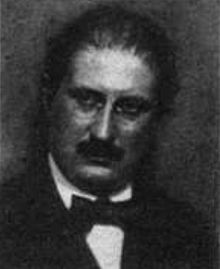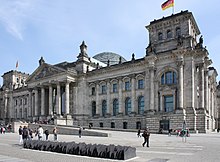Hugo Sinzheimer


Hugo Daniel Sinzheimer (born April 12, 1875 in Worms ; died September 16, 1945 in Bloemendaal- Overveen, Netherlands ) was a German legal scholar and social democratic politician.
Life and work
After graduating from the Grand Ducal Gymnasium in Worms (today Rudi-Stephan-Gymnasium ) in 1894, Sinzheimer, who was Jewish, began a commercial apprenticeship, which he broke off after a year. He then studied law and economics in Munich , Berlin , Freiburg im Breisgau , Marburg and Halle (Saale) . During his studies he joined the Berlin State Science Association . After receiving his doctorate in law from the Ruprecht-Karls-Universität Heidelberg in 1902, he settled as a lawyer in Frankfurt am Main in 1903 . As a lawyer , he represented many political and trade union clients. For him, essential legal principles were human dignity and freedom; he was close to humanism and the free rights movement.
Hugo Sinzheimer is also known as the father of labor law in Germany . In 1914 he became co-editor of the journal Arbeitsrecht . He was also legal advisor to the German Metalworkers' Association . During the November Revolution he was provisional police chief of Frankfurt am Main. He worked out Article 165 of the Weimar Imperial Constitution , which laid the foundation for anchoring the councils in economic life. From 1920 he was professor for labor law and legal sociology at the University of Frankfurt . In 1921 he initiated the establishment of the Academy of Labor . From 1925 to 1931, together with Gustav Radbruch and Wolfgang Mittermaier, he was the editor of the magazine Die Justiz , the publication of the Republican Judges' Association . In the Weimar Republic he was deployed several times as an arbitrator in collective bargaining disputes and, although actually close to the union, pushed through two wage cuts during the metal workers' strike of 1930. In 1928 the ADGB convened a high-ranking commission that included Sinzheimer, Fritz Baade , Rudolf Hilferding , Erik Nölting and Fritz Naphtali . The task was to develop an economic policy basic program. Napthali published the results in his book Economic Democracy . Your essence, path and goal (1928).
After the " seizure of power ", the confessing Jew was taken into " protective custody " in February 1933 . After his release in April 1933, Sinzheimer fled to the Netherlands, where he became professor of legal sociology in July 1933 (inaugural address November 6, 1933), first in Amsterdam and later in Leiden . In September 1933 his license to teach in the German Reich was revoked; in April 1937 he was expatriated . In May 1937 the University of Heidelberg withdrew his doctorate from him. In May 1940, the month of the German occupation of the Netherlands , Sinzheimer tried unsuccessfully to flee to England. Shortly afterwards, he was arrested and held in northern Germany for two months. After his release he returned to Amsterdam. In February 1941 he was dismissed as a university professor in Leiden. In August 1942, Sinzheimer and his wife were arrested again and taken to the collection point at the SD headquarters in Amsterdam's Euterpestraat, but released after advocacy. Sinzheimer spent the following years until the end of the war in changing quarters underground. After the liberation , Sinzheimer was “exhausted and malnourished”; he died a few months later from the consequences of life in illegality.
Political party
During his studies, Sinzheimer belonged to left-wing liberal organizations. After the outbreak of World War I in 1914, Sinzheimer joined the SPD , where he joined the Hofgeismar Circle .
MP
Sinzheimer was 1919 /20 member in the Constituent Weimar National Assembly . There, on July 16, 1919, he justified his parliamentary group's motion to include the passage “The death penalty has been abolished” in the constitution. In June 1919 he tried to become Reich Minister of Labor . But he was defeated in an internal party vote with 35 to 69 votes against Alexander Schlicke . From 1917 to 1933 he was a city councilor in Frankfurt am Main .
Commemoration
A memorial plaque is attached to Sinzheimer's birthplace in Worms. The Sinzheim Institute of the Faculty of Law at the University of Amsterdam is named after Sinzheimer, as is a street in Frankfurt am Main. Since 1992 one of the 96 memorial plaques for members of the Reichstag murdered by the National Socialists has been commemorating Sinzheimer near the Reichstag in Berlin . On April 29, 2010, the Otto Brenner Foundation opened the Hugo Sinzheimer Institute for Labor Law (HSI) in Frankfurt am Main. The HSI awards him the Hugo Sinzheimer Prize for outstanding dissertations in the field of labor law and labor law sociology. Prize winners are:
- 12. Prize winner: Stephan Pötters, Basic Rights and Employee Data Protection
- 11. Prize Winner: Tim Husemann, The Ban on Party Political Activity - On the Interpretation of Section 74 Paragraph 2 Sentence 3 BetrVG
- 10. Prize winner: Andrea Potz, Facilitation of evidence in labor law using the example of the law of equal treatment
- 9. Prize winner: Benedikt Schmidt, collective bargaining pluralism in the system of labor law
- 8th award winner: Ralf Nöcker, Pension Fund - Pension Fund and Financial Situation
- 7th Prize Winner: Robert Kretzschmar, The Role of Freedom of Association for Employment Relationships Beyond the Concept of Employees
- 6. Prize winner: Niklas Wagner, International Protection of Social Rights - the control activities of the Committee of Experts for the Application of the Conventions and Recommendations of the International Labor Organization
- 5. Prize winner: Annedore Flüchter, collective agreements and conflict resolution in SGB V
- 4th Prize Winner: Eva Dreyer, Race Relations Act 1976 and Racial Discrimination in Great Britain
- 3rd award winner: Michael Hammer, The industrial constitutional duty to protect the employee's freedom of self-determination
- 2. Prize winner: Martina Benecke, participation rights and codetermination in staff representation law
- 1st prize winner: Martin Becker, employment contract and employment relationship in Germany. From the beginning of industrialization to the end of the German Empire
Individual evidence
- ↑ Martin Schumacher (Ed.): MdR The Reichstag members of the Weimar Republic in the time of National Socialism. Political persecution, emigration and expatriation 1933–1945. 3rd edition, Droste-Verlag, Düsseldorf 1994, ISBN 3-7700-5183-1 , pp. 475, 477.
- ^ With reference to information provided by Sinzheimer's daughter: Schumacher, MdR , p. 477.
- ↑ Eberhard Kolb, Friedrich Ebert as President of the Reich - Administration and Understanding of Office , Oldenbourg Wissenschaftsverlag, 1997, ISBN 3-486-56107-3 , page 39, footnote 98.
- ↑ Now under the umbrella of the Hans Böckler Foundation . HSI. Accessed December 31, 2018.
Fonts
- Wages and offsetting. A contribution to the teaching of commercial employment contracts on the basis of imperial law. Diss. Univ. Heidelberg, Berlin 1902.
- The corporate labor standards contract. Leipzig 1907.
- Do we need a labor tariff law? Legal issues of the collective agreement. Jena 1913.
- A labor tariff law. The idea of social self-determination in law. 1916.
- Basics of labor law. Jena 1921.
- The problem of man in law. Groningen 1933.
- Jewish classics of German law. Amsterdam 1938 ( reprinted by Vittorio Klostermann with a foreword by Franz Böhm , Frankfurt am Main 1953).
- Legislation theory. The idea of evolution in law. Haarlem 1949 (posthumous)
- Labor law and sociology of law. Collected essays and speeches. Published by Otto Kahn-Freund and Thilo Ramm, two volumes, Europäische Verlagsanstalt, Frankfurt am Main 1976.
literature
- Eckhard Hansen, Florian Tennstedt (Eds.) U. a .: Biographical lexicon on the history of German social policy from 1871 to 1945 . Volume 2: Social politicians in the Weimar Republic and during National Socialism 1919 to 1945. Kassel University Press, Kassel 2018, ISBN 978-3-7376-0474-1 , p. 181 f. ( Online , PDF; 3.9 MB).
- Hugo Sinzheimer . In: Franz Osterroth : Biographical Lexicon of Socialism . Volume 1: Deceased Personalities. Verlag JHW Dietz Nachf. GmbH, Hanover 1960, pp. 292-293.
- Keiji Kubo: Hugo Sinzheimer - father of German labor law. Biography (Original title: Aru-hōgakusha-no-jinsei - Hugo Sinzheimer. Translated by Monika Marutschke), Bund, Cologne 1995, ISBN 3-7663-2647-3 . ( Content )
- Susanne Knorre : Social self-determination and individual responsibility. Hugo Sinzheimer (1875-1945). A political biography. Frankfurt am Main 1991, ISBN 3-631-43436-7 (= contributions to political science , volume 45, also dissertation at the University of Hamburg 1990).
- Hubert Rottleuthner : Three legal sociologists: Eugen Ehrlich , Hugo Sinzheimer, Max Weber . In: Erk Volkmar Heyen (Ed.): Historical sociology of law. Frankfurt am Main 1986, pp. 227-252.
- Sandro Blanke: Social law or collective private autonomy? Hugo Sinzheimer in the context after 1900. Mohr Siebeck, Tübingen 2005.
- Sandro Blanke: Sinzheimer, Hugo Daniel. In: New German Biography (NDB). Volume 24, Duncker & Humblot, Berlin 2010, ISBN 978-3-428-11205-0 , p. 474 f. ( Digitized version ).
- Abraham de Wolf: Hugo Sinzheimer and Jewish legal thinking in German labor law. Published by the Centrum Judaicum , Hentrich and Hentrich , Berlin 2013, ISBN 978-3-95565-067-4 (= Jewish miniatures , volume 159).
- Christoph Müller: Hugo Sinzheimer (1875-1945). Self-organization and self-administration in labor law. In: Detlef Lehnert (ed.): From left liberalism to social democracy. Political life in historical conflicts of direction 1890–1945. Böhlau Verlag, Cologne, Weimar, Vienna 2015, pp. 145–174. ISBN 978-3-412-22387-8 .
Web links
- Literature by and about Hugo Sinzheimer in the catalog of the German National Library
- Hugo Sinzheimer in the database of members of the Reichstag
- Hugo Sinzheimer in the online version of the Reich Chancellery Edition Files. Weimar Republic
- Hugo Sinzheimer Institute: Hugo Sinzheimer Prize
- More detailed biography on the website of the Warmaisa e. V. about famous citizens of Worms of the Jewish faith
- AIAS-HSI - Amsterdam Institute for Advanced Labor Studies (AIAS) and Hugo Sinzheimer Institute (HSI) of the Faculty of Law at the University of Amsterdam (English)
- Hugo Sinzheimer Institute Website of the Hugo Sinzheimer Institute of the Otto Brenner Foundation
- Sinzheimer, Hugo Daniel. Hessian biography. (As of January 8, 2020). In: Landesgeschichtliches Informationssystem Hessen (LAGIS).
- Sinzheimer, Hugo in the Frankfurt personal dictionary
| personal data | |
|---|---|
| SURNAME | Sinzheimer, Hugo |
| ALTERNATIVE NAMES | Sinzheimer, Hugo Daniel (full name) |
| BRIEF DESCRIPTION | German legal scholar and social democratic politician |
| DATE OF BIRTH | April 12, 1875 |
| PLACE OF BIRTH | Worms |
| DATE OF DEATH | September 16, 1945 |
| Place of death | Bloemendaal -Overveen, Netherlands |



